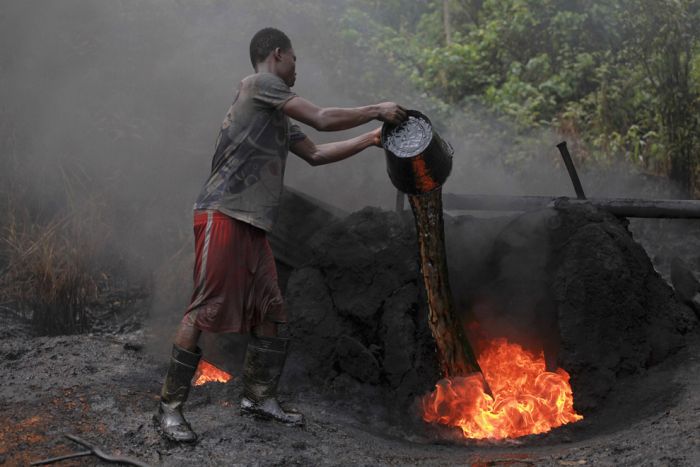|
|
Oil Bunkering, Nigeria
|
Small molecules like those in propane gas, naphtha, gasoline for cars, and jet fuel have relatively low boiling points, and they are removed at the start of the fractional distillation process. Heavier petroleum products like diesel and lubricating oil are much less volatile and distill out more slowly, while bunker oil is literally the bottom of the barrel; the only things more dense than bunker fuel are carbon black feedstock and bituminous residue which is used for paving roads (asphalt) and sealing roofs.
Bunker fuel is technically any type of fuel oil used aboard ships. It gets its name from the containers on ships and in ports that it is stored in; in the days of steam they were coal bunkers but now they are bunker fuel tanks. The Australian Customs and the Australian Tax Office define a bunker fuel as the fuel that powers the engine of a ship or aircraft. Bunker A is No. 2 fuel oil, bunker B is No. 4 or No. 5 and bunker C is No. 6. Since No. 6 is the most common, "bunker fuel" is often used as a synonym for No. 6. No. 5 fuel oil is also called navy special fuel oil or just navy special; No. 5 or 6 are also called furnace fuel oil (FFO); the high viscosity requires heating, usually by a recirculated low pressure steam system, before the oil can be pumped from a bunker tank. In the context of shipping, the labeling of bunkers as previously described is rarely used in modern practice.
Since the 1980s the International Organization for Standardization (ISO) has been the accepted standard for marine fuels (bunkers). The standard is listed under number 8217, with recent updates in 2005 and 2010. They have broken it down to Residual and Distillate fuels. The most common residual fuels in the shipping industry are RMG and RMK. The differences between the two are mainly the density and viscosity, with RMG generally being delivered at 380 centistokes or less, and RMK at 700 centistokes or less. Ships with more advanced engines can process heavier, more viscous, and thus cheaper, fuel. Governing bodies (i.e. California, European Union) around the world are starting to limit the maximum sulfur of fuels burned in their ports to limit pollution. This is where Marine Distillate Fuels come into play. They have similar properties to Diesel #2 which is used as road Diesel around the world. The most common grades used in shipping are DMA and DMB.
|
|









